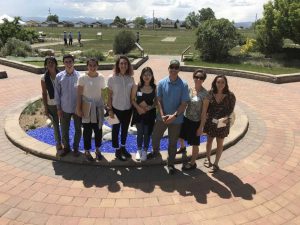We kicked off our summer research with a two-day trip up to Boulder and Larimer counties to meet with numerous experts on regional climate issues such as water distribution and flood recovery. The trip was very interesting and we learned a great deal about important local issues while having the chance to speak with key stakeholders. Below are short descriptions of our five meetings.
The Northern Colorado Water Conservancy District
Frank Kinder and Jeff Stahla
A visit with Frank Kinder, the Water Efficiency Program Manager, and Jeff Stahla, a Public Information Coordinator. We visited their headquarters in Berthoud, Colorado that includes their Conservation Gardens. These gardens are meant to inform and educate property owners about planting and landscaping methods to decrease water use. We then headed out to visit a few of the District’s major reservoirs to get a better understanding of the system at large. One site we visited is the Windy Gap Project, where Northern Water plans to build a new dam to allow greater water storage capacity. We discussed the intersection of agriculture and development occurring in this geographical area and how this intersection affects regional water.
City of Longmont Community and Neighborhood Resources Office
Carmen Ramirez and Wayne Tomac
We then met with Carmen Ramirez and Wayne Tomac, who work in Community & Neighborhood Resources for the City of Longmont, to discuss Longmont’s Resilience for all/Resiliencia para todos program. Resilience for all focused on connecting Boulder County’s Latinx community to members of county and city government and to community resources, working specifically to address inequity in the emergency response to Boulder’s 2013 floods. Ramirez and Tomac spoke to us about their work to strengthen community groups, identify community assets, and ensure information regarding public resources and emergency response plans were available in English and Spanish. They also introduced us to the concept of a cultural broker, which is central to Resilience for All and describes individuals whose skills and positionality allow them to bridge distinct cultural groups. Resilience for all seeks to work with and compensate these individuals to better connect the City of Longmont to vulnerable segments its population.
Boulder County Flood Recovery
Carolina Van Horn
We met with Carolina Van Horn, a Flood Recovery Planner for Boulder County. We began in Fourmile Canyon, which sustained extensive damage following the 2013 floods. Van Horn works extensively coordinating Boulder County efforts with FEMA (Federal Emergency Management Agency) and we discussed the process for home buyouts following major disasters. These buyouts provide the option to homeowners whose homes were substantially damaged to take a buyout option on the pre-disaster value of their home rather than pursue rebuilding in the same location. The buyout program aims to disincentivize rebuilding in hazard areas, both to protect human life and to avoid repeat federally-funded rebuilding. We also discussed some other aspects of the recovery and how Boulder County is attempting to leverage rebuilding to also make the new infrastructure more resilient to future hazards. This includes rebuilding with an eye towards 100-year flood standards as well as using technology to map and better understand future flood potentials.
Boulder County Transporation Department
Stacey Proctor
Our visit with Stacey Proctor, the Communications Specialist with the Boulder County Transportation Department, informed us of Boulder County’s priorities for creating resilient infrastructure under various climate variability scenarios. The goals of the resiliency study were to enhance 1) institutionalized resiliency; 2) withstand shocks; 3) reduce shock, and 4) responsiveness to stresses. The action categories included improving infrastructure, regulation of flood plains, and incentives and education. This resiliency study will then inform the 2012 transportation master plan, which is to be updated this year. A 2019 survey revealed that the majority of Boulder County residents were in favor of increasing expenditures for flood response efforts, indicating that flood response was a high priority issue. Additionally, the group discussed how increasing housing costs and strict development laws will create opportunities to expand upon existing transportation services, such as bike lanes and public transit throughout the county.
City of Boulder Department of Climate Initiatives
Brett KenCairn
For our final visit, we met with Brett KenCairn, Senior Sustainability and Resilience Policy Advisor for the City of Boulder. KenCairn discussed his views on the concepts of resiliency and sustainability, which are currently buzz words whose meanings are not always locked down. Resilience for KenCairn and his department means change. Sustainability means stability. The two together lead to the question of how to create stable change, especially in the face of climate change and a rapidly changing natural world surrounding us. KenCairn also discussed how his department is recentering its resilience efforts to community benefits and equity. With these goals at the center of the plans, the city of Boulder hopes to build stronger networks and solve adaptation, mitigation, and resilience issues more efficiently and with the community in mind.
